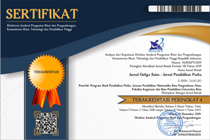IMPLEMENTION OF MASTERY LEARNING STRATEGY TO IMPROVE STUDENT LEARNING OUTCOMES IN THE BASIC OF PHYSICS II
Abstract
This research aims to describe the learning outcomes of basic physics learning II students Industrial Engineering of Pelalawan Institute of Technologyon the concept of electricity. The subject of this research is the second semester students of Industrial Engineering of Pelalawan Institute of Technology. The instrument used for data collection is the learning outcomes test given after the application of mastery learning strategy. Data were analyzed using descriptive analysis technique covering the students' learning achievement. The results of data analysis showed student learning outcomes categorized average. Application of strategy Mastery learning can improve student's basic physics learning outcomes on electrical materials.
Keywords
Full Text:
PDFReferences
Abu Ahmadi, 2005. Strategi Belajar Mengajar. Pustaka Setia, Bandung.
Agus Suprijono, 2013. Cooperative Learning Teori dan Aplikasi PAIKEM. Pustaka Pelajar, Yogyakarta.
Ajogbeje, O. J., 2012. Path-analytic model and the effect of some teaching strategies on variables affecting achievement in junior secondary school mathematics in Ondo State. Unpublished Ph.D. Thesis, Ekiti State University, Ado – Ekiti, Nigeria.
Depdiknas, 2006. Panduanumum Pengembangan Sistem Assesmen Berbasis Kompetensi (Buku I). Direktorat Jendral pendidikan Tinggi, Jakarta.
Depdiknas, 2008. Panduan Penyelenggaraan Pembelajaran Tuntas (MasteryLearning). Depdiknas, Jakarta.
Djamarah, 2002. Strategi Belajar Mengajar. Rineka Cipta, Jakarta.
Hamzah, B., 2010. Perencanaan Pembelajaran. Bumi Aksara, Jakarta.
Kock, Z., Taconis, R., Bolhuis, S & Graveimejer, K., 2014. Creating A Culture Of Inquiry In The Classroom While Fostering An Understanding Of Theoretical Concepts In Direct Current Electric Circuits: A Balanced Approach.International Journal of Science and Mathematics Education (IJMSE), 13 (1), 45-69.
Kunandar, 2007. Guru Profesional. Rajawali Pres, Jakarta.
Made Alit Mariana, 2003. Pembelajaran Remedial.Dirjen Dikdsasmen, Jakarta. Majid,E.D., & Zahra, S. K., 2010. Effect of mastery learning method on
performance and attitude of weak students in chemistry. Elsevier Ltd. Iran.
Mulyana, 2004. Implementasi Kurikulum 2004 Pedoman Belajar KBK. Rosdakarya, Bandung.
Olufunmilayo, I. O., 2010. Enhanced mastery learning strategy on achievement and self concept in senior secondary school chemistry. Humanity and social sciences journal, 5 (1),19-24.
Purwanto, 2002. Psikologi Pendidikan. Remadja Karya, Bandung.
Rosenthal, A. S. & Henderson, C., 2006. Teaching about circuits at the introductory level: An emphasis on potential difference. American Journal of Physics. 74(4),324-328.
Smith D. P., & Kampen P. V., 2011. “Teaching electric circuits with multiple batteries: A qualitative approach,” Phys. Rev. ST Phys. Educ. Res. 7, 0201151020115-10.
Sukmadinata, 2005. Landasan Psikologi Proses Pendidikan. PT Rosda Karya, Bandung.
Suryo Subroto, 2002. Proses Belajar Mengajar di Sekolah. Rineka Cipta, Jakarta.
Telimoye Leesi, M., & Obaitan N. Georgina, 2015. Effect of Mastery Learning on Senior Secondary School Students' Cognitive Learning Outcome in Quantitative Chemistry. N. Journal of Education and Practice, 6 (5), 34-38.
Wena, M., 2009. Strategi Pembelajaran Inovatif Kontemporer. Bumi Aksara, Jakarta.
DOI: http://dx.doi.org/10.31258/jgs.5.2.104-109
Refbacks
- There are currently no refbacks.
Copyright (c) 2018 Azizahwati Azizahwati, Sugoro Bhakti Sutono, Salman Alfarisi

This work is licensed under a Creative Commons Attribution 4.0 International License.
Jurnal ini terdaftar dan terindeks pada:
- Crossref
- Google Scholar
- Crossref
- Garuda
- Sinta
- Researchgate
- Dimensions
- Base
- Scilit
- OneSearch
- Road
- CiteFactor
- ResearchBib
- WorldCat



















